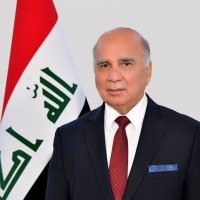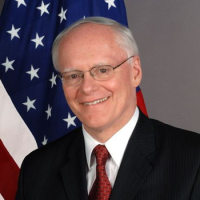Iraq And the United States: A Conversation with Iraq's Deputy PM and Foreign Minister Fuad Hussain
Submit a question
Iraq's newly inaugurated Prime Minister Mohamad Al Sudani told the Wall Street Journal, in his first interview with the Western media, that his country needs the presence of "foreign forces," particularly in order to eliminate ISIS. This statement comes at an important time for US-Iraqi relations and the strategic partnership between the two countries that is defined by the 2008 Strategic Framework Agreement on the diplomatic, military, security and economic fronts. As Iraq navigates the various challenges on the domestic front, both politically and economically, and continues its reintegration into the region, strengthening its relations with the United States is an important step, necessary to advance peace, security and prosperity.
To better understand the Iraqi perspective, the Wilson Center's Middle East Program hosted Deputy Prime Minister and Foreign Minister of Iraq Fuad Hussein in conversation with Ambassador Jim Jeffrey, Chair of the Middle East Program and former Ambassador to Iraq.
Economic reform is a top priority for the government in Iraq, particularly to address the surge in unemployment and heavy reliance on oil revenues. Deputy PM and Foreign Minister Fuad Hussein, who served as Iraq’s Finance Minister of a previous cabinet, believes that change is possible through decentralization.
Today, Minister Hussein stated, “The majority of the [Iraq’s] income, 88 to 90 percent of the income, is coming from oil, and oil is still centralized, and is still in the hands of the government.” The long-held culture of centralization prevents the country from achieving meaningful economic growth. In order to advance towards a market-based economy, he contended, “we need many things. First, laws. Second, implementing laws. And third, changing the culture. Here, we are talking about others who can help us. We need know-how.”
For Minister Hussein, the United States can provide this technical knowledge and assistance to help Iraq decentralize. America can also be an important ally in Iraq’s pursuits to produce oil and natural gas more sustainably, a goal to both diversify the economy and protect the climate.
Moderator Ambassador James Jeffrey, Chair of the Middle East Program and former Ambassador to Iraq, remarked that, “It is extraordinarily rare to see an official from the region talk about decentralization as the way forward, in fact, it is usually the opposite. But, I have seen it work in Iraq, as has Fuad, because he has made it work.”
Iraq’s role in the region
From the outset, Ambassador Jeffrey noted, “There can be no security in the region without a secure, stable, and prosperous Iraq.” Minister Hussein built on this idea throughout the conversation. While Iraq engaged in conflict for the past fifty years, it has also motivated the country to act as a regional peacemaker and forge positive relations with its neighbors. For example, Minister Hussein noted Baghdad’s essential role in resolving disputes with countries such as Egypt, Jordan, and Turkey.
For this reason, Minister Hussein believes Iraq is key to promoting security worldwide. When ISIS occupied one-third of Iraq’s territory at the height of its power, not only was Baghdad under threat, but the terrorist organization was also in a position to conduct terrorist attacks in Western capitals. Resolving conflict and maintaining peace through democratic, diplomatic means is imperative. For Minister Hussein and Iraq, “we never think about going to war because we know the results.”
Syrian stability
When asked about how the US can play a role in the fight against the Islamic State, Minister Hussein argued it’s important for Washington to have a more concrete policy on the Syrian regime. In the past, when the United States sought regime change in Syria, “The regime stayed and the people left.”
Minister Hussein urged that the Syrian government needs to be involved in Syrian affairs, adding “It is impossible to find solutions to Syrian problems talking with all others without having the [Syrian] government.” He called on the international community to stop punishing Syria and instead opt to work with them in efforts to not only combat ISIS and help the Syrian people who are suffering from political, economic, and social turmoil.
Speaker

Introduction

Moderator

Former ambassador to Iraq and Turkey, and Special Envoy to the Global Coalition To Defeat ISIS
Hosted By

Middle East Program
The Wilson Center’s Middle East Program serves as a crucial resource for the policymaking community and beyond, providing analyses and research that helps inform US foreign policymaking, stimulates public debate, and expands knowledge about issues in the wider Middle East and North Africa (MENA) region. Read more
